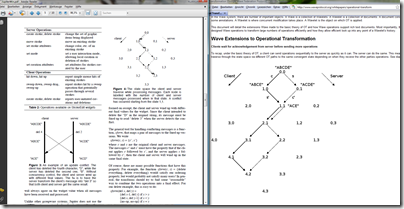Just stumbled upon this funny context-menu entry:
Well… it should be spelled: Excel
While trying out the new Mozilla Weave I came across the nice interface the guys built into their sync service. Funny messages included.
Source: http://labs.mozilla.com/weave/
“So what is it? A memory mapped file allows you to reserve a region of address space and commit physical storage to a region (hmmm, sounds like virtual memory, isn’t it?) but the main difference is that the physical storage comes from a file that is already on the disk instead of the memory manager. I will say that it has two main purposes:
OMG! You can even specifiy views on a memory mapped file… from different processes… .NET 4 FTW!
Source: http://blogs.msdn.com/salvapatuel/archive/2009/06/08/working-with-memory-mapped-files-in-net-4.aspx
I was in desperate need for an DDate equivalent running on Windows. DDate is an unix implementaion of date accoridng to the erisian calendar described in the principia discordia.
I only found some C Implementations. And since it’s fun to do I ported the original Discordian Date C code to C#.
You can download the C# sourcecode, licensed under CC-BY-NC here.
I also created a web page which displays the current discordian date and offers you to convert any gregorian date into discordian date representation.
This page can be accesses here. You can call another page with parameters and you only will get the ddate output back:
for example: http://ddate.schrankmonster.de/DiscordianDate.aspx?year=2009&month=6&day=9
Source 1: http://ddate.schrankmonster.de/
Source 2: http://dropbox.schrankmonster.de/dropped/SharpDDateLib.zip
Oh dear. Another hyped protocol/platform from Google… oh wait. It’s not from Google. It’ all started in Xerox PARC…
There are several papers that describe what Google now claims to have developed…

left: Xerox PARC Paper; right: Google Wave
Conclusion: Go and read old Papers. As it turns out almost all newly hyped things have been described in papers from years ago.
Source 1: http://www.waveprotocol.org/whitepapers/operational-transform
Source 2: http://doi.acm.org/10.1145/215585.215706